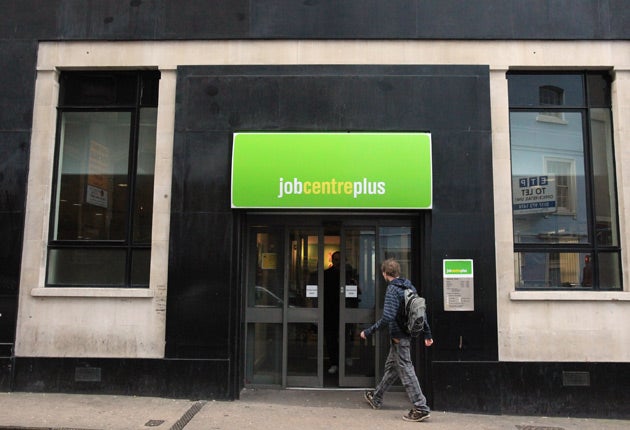Jobless total hits 10-year high

Jobcentres were said to be "creaking" under the pressure of work today as new figures showed unemployment surging to a 10-year high.
The jobless total reached 1.97 million, confounding many experts who had predicted it would break through the two million barrier, but it was still the worst figure since just after Labour came to power in 1997.
The number of people claiming Jobseeker's Allowance has now increased for 12 months in a row, up by 73,800 in January to 1.23 million, the highest total since the summer of 1999, today's figures showed.
Union leaders said the figures were "dreadful", while business leaders warned that unemployment was now on a "relentless rise" towards three million.
The data was published as Bank of England boss Mervyn King said the UK was in "deep recession" and warned policymakers may imminently resort to other rescue measures as interest rate cuts lose their impact.
Fresh job losses were announced today, including almost 400 at cash-and-carry retailer Makro through the closure of three UK superstores and 60 at newspaper group News International.
The Prime Minister met some of Britain's biggest employers today at the first session of a group set up to boost employment.
Welcoming the 22 business chiefs to Downing Street, Gordon Brown said: "I realise these are very difficult times because of the global financial recession.
"But I am sure, by working together in partnership, we can make a difference to the employment opportunities and success of the economy."
Later in the Commons he said every person who loses their job was a cause for "sadness" but pledged to take action to help people back to work.
Almost 260,000 people were made redundant in the last three months of 2008, the highest figure since records began in 1995 and an increase of 104,000 over the previous quarter.
Job vacancies fell by 76,000 to 504,000 in the three months to January, the lowest since records began in 2001, according to today's data from the Office for National Statistics.
Meanwhile, the number of people in work dropped by 45,000 in the latest quarter to 29.36 million, the lowest total since the autumn of 2007.
The number of non-UK-born workers in jobs increased by 214,000 to 3,8 million in the year to December, while employment of UK-born workers fell by 278,000 to 25.6 million.
Mark Serwotka, general secretary of the Public and Commercial Services union said: "Jobcentres are creaking under the pressure of the rising numbers of unemployed.
"In stark contrast to the obscene bonuses in the City, low paid jobcentre workers, many of whom received no pay rise at all last year, are helping people whose lives have been turned upside down by the economic crisis.
"The Government need to get ahead of the game by putting more staff into jobcentres and by re-opening offices to ensure the growing numbers of unemployed get the help and support they need.
Work and Pensions Secretary James Purnell said: "We know times are tough and we need to continue doing all we can to support people who lose their jobs find another as quickly as possible, preventing the long-term unemployment which has so scarred communities in the past from taking root."
The figures were greeted with sadness but not surprise. Paul Kenny, general secretary of the GMB union, said: "What a bleak day for our economy and for the workers and families of those now jobless."
TUC general secretary Brendan Barber said: "This is another set of dreadful figures, and we fear worse is still to come."
Shadow work and pensions secretary Theresa May said: "These figures are devastating confirmation of just how serious this recession is for millions of families across the country."
Miles Templeman, director general of the Institute of Directors, said: "Unemployment is now on a relentless rise towards three million, with little relief in sight. We are set for a long winter. But today's figures show that the public sector, at least up until the last quarter, has remained largely immune from the carnage of job cuts."
John Philpott, chief economist at the Chartered Institute of Personnel and Development (CIPD), said: "The final quarter redundancies figure of 259,000 is fairly horrendous and suggests that the CIPD forecast of 300,000 redundancies in the first quarter of 2009 will, if anything, turn out to be an underestimate."
The UK's unemployment rate is now 6.3 per cent, an increase of 1.1 per cent over the past year. The number of unemployed men increased by 106,000 in the three months to December to 1.18 million, while 790,000 women were out of work, a rise of 40,000.
The number of people unemployed for more than a year was 453,000, up by 18,000 from the previous three months, while unemployment among 16 to 24-year-olds was 616,000, up by 38,000, and the highest total since early 1995.
* Up to 3,000 jobs could be created under proposals for a new Morrisons regional distribution centre and industrial units in Bridgwater, Somerset.
Unemployment in the regions between October and December was (tabulate under region, total unemployed, change on quarter, unemployment rate)
North East 105,000 up 5,000 8.4 per cent
North West 263,000 up 33,000 7.8 per cent
Yorkshire and the Humber 173,000 down 8,000 6.6 per cent
East Midlands 142,000 up 7,000 6.1 per cent
West Midlands 204,000 up 34,000 7.7 per cent
East 165,000 up 24,000 5.5 per cent
London 294,000 down 3,000 7.2 per cent
South East 218,000 up 16,000 4.9 per cent
South West 127,000 up 13,000 4.7 per cent
Wales 100,000 up 5,000 7.0 per cent
Scotland 137,000 up 11,000 5.1 per cent
Northern Ireland 42,000 up 8,000 5.1 per cent
Subscribe to Independent Premium to bookmark this article
Want to bookmark your favourite articles and stories to read or reference later? Start your Independent Premium subscription today.

Join our commenting forum
Join thought-provoking conversations, follow other Independent readers and see their replies